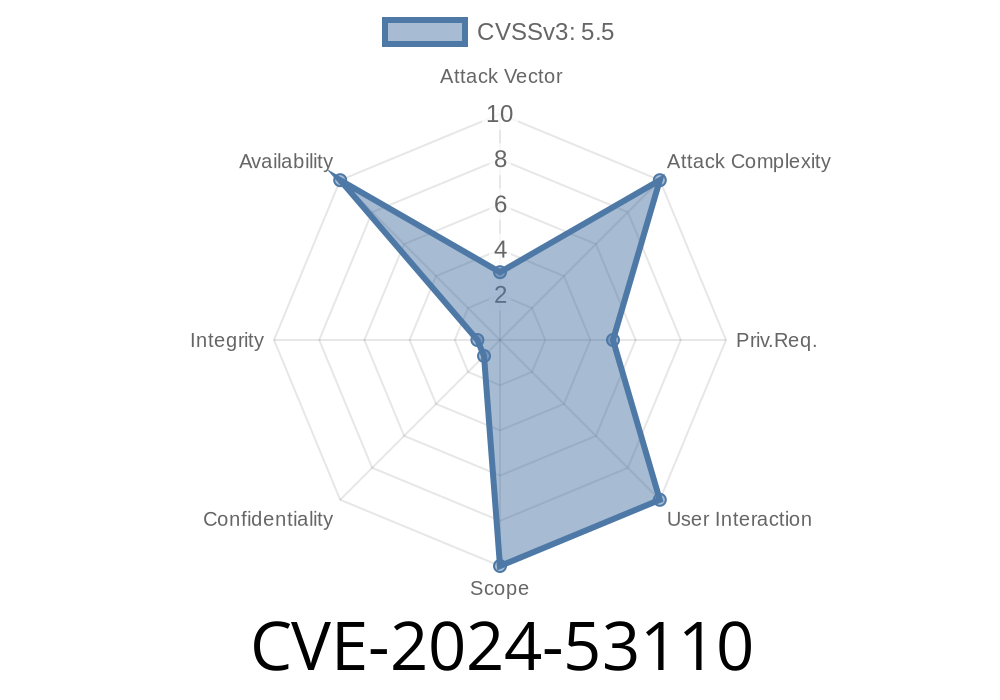Recently, a security vulnerability was found and fixed in the Linux kernel’s vp_vdpa module. The vulnerability, assigned CVE-2024-53110, originated from a subtle but critical programming mistake: forgetting to null-terminate an array that's used as an ID table. Although this might look like a small slip, it could affect the reliability and security of systems using this kernel module. In this post, we'll break down what happened, why it matters, and show you the patched code. You'll find helpful links and technical details, so you can understand and test this vulnerability yourself in simple terms.
What is vp_vdpa and Why Does This Bug Matter?
vp_vdpa stands for Virtio Paravirtualized Device API for VDPA (vDPA: vHost Data Path Acceleration), enabling high-speed inter-VM (virtual machine) networking. The bug is in an array used to tell the kernel which device IDs (virtio_device_id) this driver supports.
In C, it's a convention that such arrays are terminated with a "null" element (all fields set to zero) so the code knows when to stop iterating. Without this null termination, functions like vdpa_mgmtdev_get_classes() can run off the end of the array, reading into undefined memory. That means misbehaving code and possibly a system crash or information leaks—classic undefined behavior territory.
Here's what the buggy code could look like in the Linux kernel source
static const struct virtio_device_id id_table[] = {
{ VIRTIO_ID_NET, VIRTIO_DEV_ANY_ID },
// ... maybe more entries
// Oops! No null terminator!
};
When some part of the kernel calls functions that walk this array (e.g., to register devices), it keeps reading memory until it hits zeros. If there are no zeros, it keeps going, possibly reading garbage or causing a crash.
Information Leakage: Kernel memory might be disclosed if the code reads sensitive data.
- Escalation Paths: Though not directly a privilege escalation bug, undefined behavior in the kernel is dangerous ground.
This is a subtle but real security blunder. While not remotely exploitable in most environments, an attacker with local access, or a compromised device, might leverage it toward destabilizing or probing the kernel.
The Patch and Fixed Code
The fix is simple but important: always allocate space for a terminating null (all-zero) entry. Here’s what the correct code should look like:
static const struct virtio_device_id id_table[] = {
{ VIRTIO_ID_NET, VIRTIO_DEV_ANY_ID },
// ... other device IDs
{ } // <-- Null terminator
};
Or if allocated dynamically
struct virtio_device_id *id_table = kcalloc(num_ids + 1, sizeof(*id_table), GFP_KERNEL);
// fill in id_table[..num_ids-1]
// id_table[num_ids] is automatically zeroed
The critical piece is id_table[num_ids] = {};, meaning it marks the end of the array.
Upstream kernel commit:
https://git.kernel.org/pub/scm/linux/kernel/git/torvalds/linux.git/commit/?id=733ef9eaf3b390928b3525146f51ea67280a1c71
Many C functions—especially in the kernel—work with array “sentinels.” For instance
for (i = ; id_table[i].device != ; i++) {
// do something
}
Just keep going with unpredictable consequences
With high privilege code, this behavior can cascade into catastrophic bugs.
While this flaw doesn't yield a shell to an attacker outright, it is an exploitation primitive
- Local user DoS: A malicious user (or guest VM) could try to trigger the buggy code path, potentially crashing the host.
- Crash for information leaks: By manipulating memory, they might be able to leak kernel values under special conditions.
Stability risk for production servers: A bug that can crash your hyperscaler!
In general, kernel array overrun vulnerabilities can sometimes be chained with other bugs for privilege escalation.
How to Test Whether a Kernel is Vulnerable
1. Check your kernel version: anything before the patch date (May 2024) may be vulnerable if using vDPA and virtio.
Trace kernel logs for unusual panics when loading vDPA drivers.
3. If you build your own kernels, inspect the source code for null-terminated id_tables in drivers/vdpa/ if you use paravirtualized networking.
Mitigation and Recommendations
- Update Immediately: Upgrade to a kernel where this commit is present.
- Audit Similar Code: If you write or maintain kernel drivers, always null-terminate device ID tables.
- Monitor CVE Feeds: Subscribe to Kernel.org’s security page and NVD.
Reference Links
- CVE-2024-53110 NVD entry
- Linux Kernel Patch Commit
- Linux vDPA Documentation
Final Thoughts
CVE-2024-53110 is a good reminder that even small programming errors, especially in low-level system code, can have big security consequences. Always pay attention to C array conventions if you work on kernel code. For systems using vDPA or virtio devices, updating should be done as soon as possible. Stay tuned to security advisories for fixes and details like these!
Timeline
Published on: 12/02/2024 14:15:11 UTC
Last modified on: 12/19/2024 09:39:26 UTC
